Outstanding cardiovascular researchers and Indigenous health leaders celebrated at CVRN Showcase and Ministerial Awards
Gifted NSW cardiovascular researchers received Ministerial awards for their outstanding achievements at the recent Cardiovascular Research Network Showcase 2024, which put the spotlight on First Nations heart health.
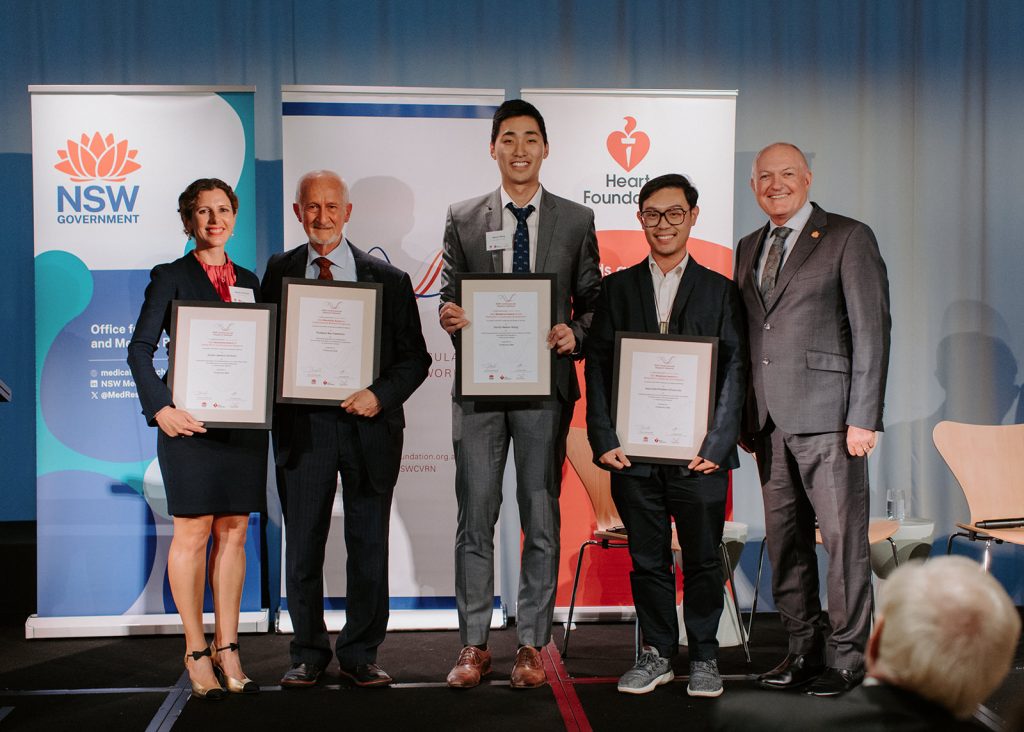
Archaeologists believe that one of the oldest manmade structures in the world are the Brewarrina fish traps created by Aboriginal people on the Barwon River in north-west NSW. Spanning half a kilometre, the traps involve a complex network of tall and short stone walls arranged to form channels and storage ponds to catch fish. “The Brewarrina fish traps are a reminder that Aboriginal people of Australia understood the importance of healthy bush tucker as well as the country they live on and community they live in,” said Uncle Michael West from the Metropolitan Local Aboriginal Land Council, as he helped launch the Cardiovascular Research Network (CVRN) 2024 Showcase and Ministerial Awards. “Aboriginal people were the first to practice medicine and their concept of wellbeing was holistic, so it involved health of country, culture, community, spirit, body and mind,” he explained.
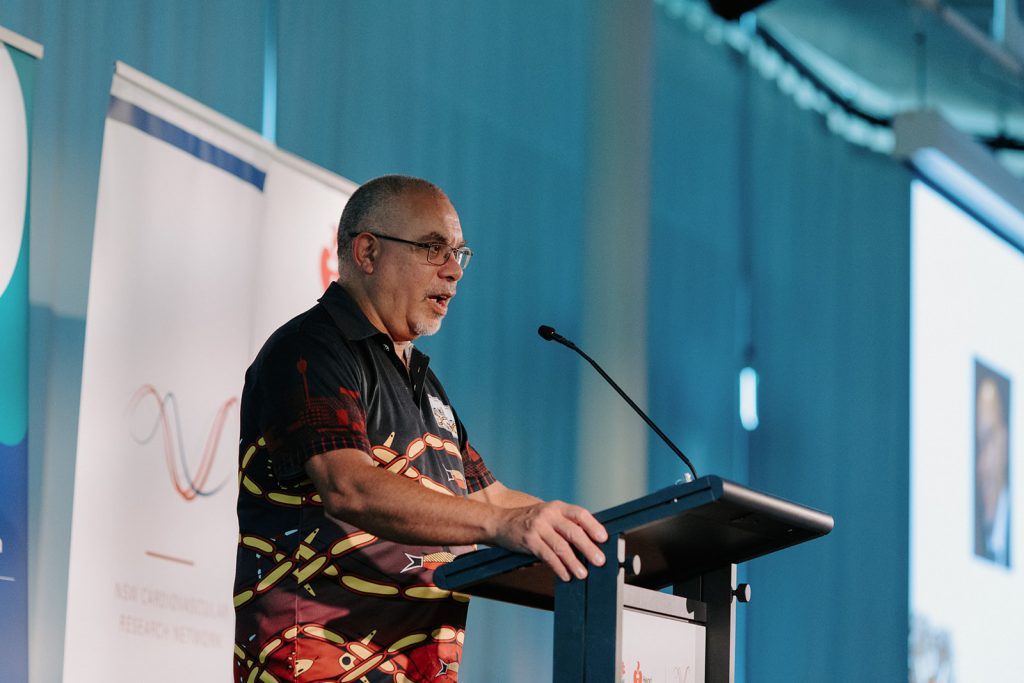
Prioritising First Nations heart health
This powerful Welcome to Country marked the opening of the Cardiovascular Research Network Showcase and Ministerial Awards, presented by the Heart Foundation, CVRN and NSW Health. The event took place on Gadigal land at the Art Gallery of NSW and this year’s theme was First Nations heart health: Healing and strength for the future. The evening was hosted by Rae Johnston, a proud Wiradjuri Woman and multi-award-winning STEM journalist and broadcaster. In attendance were Her Excellency, the Hon Governor of NSW, Margaret Beazley, AC KC, and the Minister for Medical Research, the Hon David Harris MP, who presented the awards to the trailblazing recipients.
Professor Andrew Boyle, Chair of the Cardiovascular Research Network, reflected on the high impact research across the spectrum of cardiovascular issues that has been made possible by the 19-year partnership between NSW Health, the Heart Foundation and the CVRN. He also discussed the progressive shift and innovation taking place in participatory research. Embracing new models of care which prioritise sharing power in system reform for First Nations Health is a priority for the Office for Health and Medical Research, said Adjunct Professor Jean–Frédéric Levesque, Deputy Secretary, Clinical Innovation and Research at NSW Health. “This approach supports the overall NSW Health response to better meet the needs and aspirations of Aboriginal people and communities,” Dr Levesque explained. “The CVRN is a key partner for NSW Health in rolling out the Cardiovascular Research Capacity Program, which launched in June 2018. We value the CVRN’s commitment to encouraging collaboration, supporting the research workforce and building capacity.”
Dr Sandra Eades, AO, a proud Noongar woman and Chief Medical Advisor, First Nations Health for the Heart Foundation, highlighted the importance of consultation and holistic health pathways. Indigenous health leaders including Ray Kelly (proud Gomeroi man), Michelle Kennedy (proud Wiradjuri woman) and Aunty Audrey Trindall (proud Gomeroi woman) also spoke of their powerful collaborative work with Aboriginal communities in the areas of diabetes, stroke and smoking cessation.
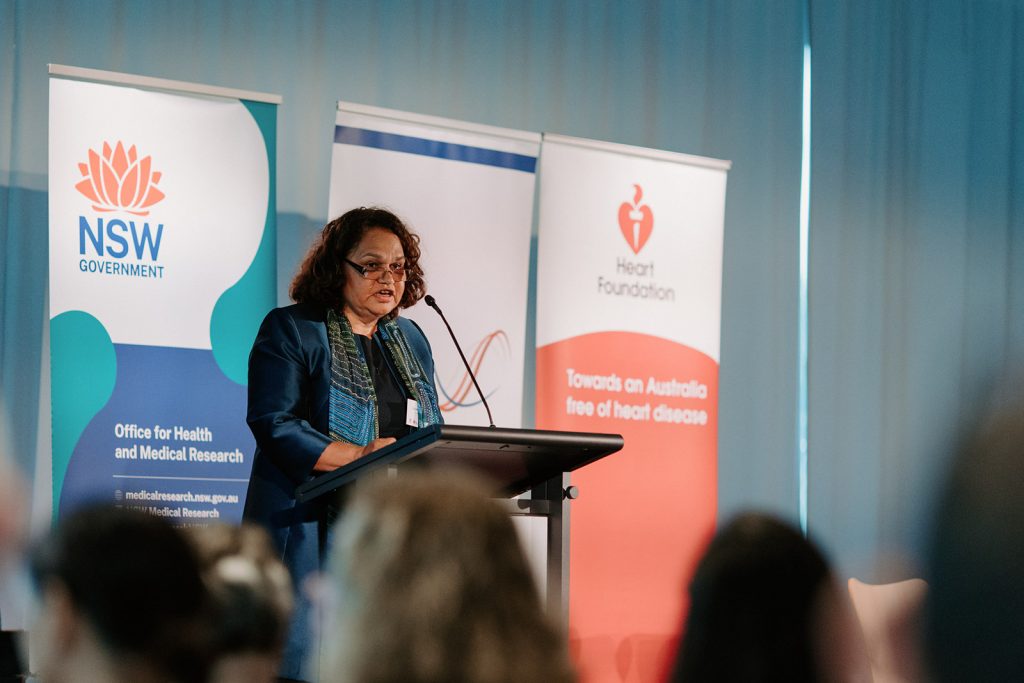
Ministerial awards for excellence and innovation
Australia is a world leader in the area of cardiovascular research and clinical practice. The Ministerial awards recognise these impressive contributions from emerging new talents, researchers in the early to mid-stage of their career and researchers with decades of experience. This year as always, the judges were spoiled for choice in selecting award recipients. This meant that for the Rising Star in Cardiovascular Research award, they unanimously chose to acknowledge two very talented researchers. In total, the following four gifted researchers each received an award in acknowledgement of their outstanding achievements and contributions:
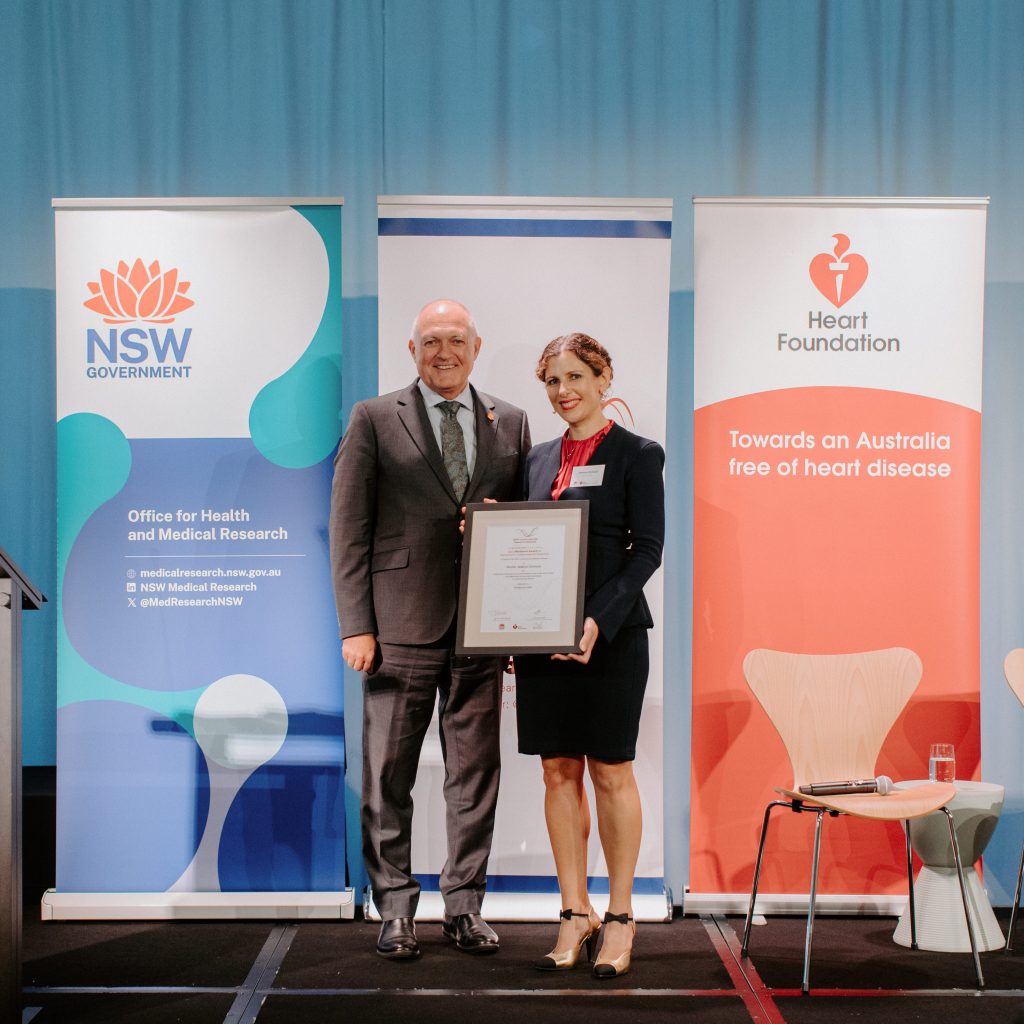
Dr Jessica Orchard: Ministerial Award for Rising Star in Cardiovascular Research
“Cardiovascular disease is a very important health priority, as our research shows that about 3 in 4 Australians are at risk and about 4 in 5 don’t do enough physical activity,” says Orchard who is Senior Research Fellow and a National Health and Medical Research (NHMRC) Emerging Leader Fellow at The University of Sydney in the School of Public Health. “Prevention programs, especially those focussing on physical activity are of vital importance. My research focuses on two programs – screening for atrial fibrillation (AF) in the elderly to prevent stroke and screening young athletes for conditions associated with sudden cardiac death.” Through this work Orchard is helping to improve the quality of cardiac screening programs to prevent sudden cardiac death and catastrophic disability from stroke.
Orchard is currently leading the ARENA Project, which involves an international, multidisciplinary team building an Australasian registry based on athlete screening electrocardiograms (ECGs). The aim of the study is to improve understanding of clinical outcomes related to cardiovascular health in screened athletes. In her work Orchard is exploring the use of digital health and implementation of novel eHealth tools. She is also interested in the legal and ethical aspects of screening, such as data privacy issues with mHealth apps and accuracy of device algorithms. “A number of my projects have focussed on under-represented populations such as female athletes and Indigenous people living in remote areas,” she explains.
In her 10-year research career specialising in CVD health, Orchard has built and engaged in numerous international collaborations across the US, UK, Europe and South Africa. She has published over 80 papers, with over 19,000 citations and given more than 100 conference presentations. Orchard has held continuous National Heart Foundation and NHMRC Fellowships since finishing her PhD in 2020. These include a Heart Foundation Postdoctoral Fellowship (2021-22) and NHMRC Investigator Grant (2023-27). She was also selected for the World Heart Federation Emerging Leaders Program in 2023.
“I’m extremely honoured to receive this award and thankful to the CVRN and the Heart Foundation for their support,” Orchard says. “I have been very fortunate to work with world-class collaborators and amazing mentors such as Professor Ben Freedman, who was my PhD supervisor and who also received an award. The CVRN has been such an important source of support for early and mid-career researchers such as myself. It provides many opportunities for travel, funding, grants and networking and collaboration events. I hope I can continue to make a positive difference in improving the design and implementation of cardiac screening and prevention programs. Awards such as this provide very important recognition for early and mid-career researchers and make an important contribution to building a track record for future funding and fellowship applications.”
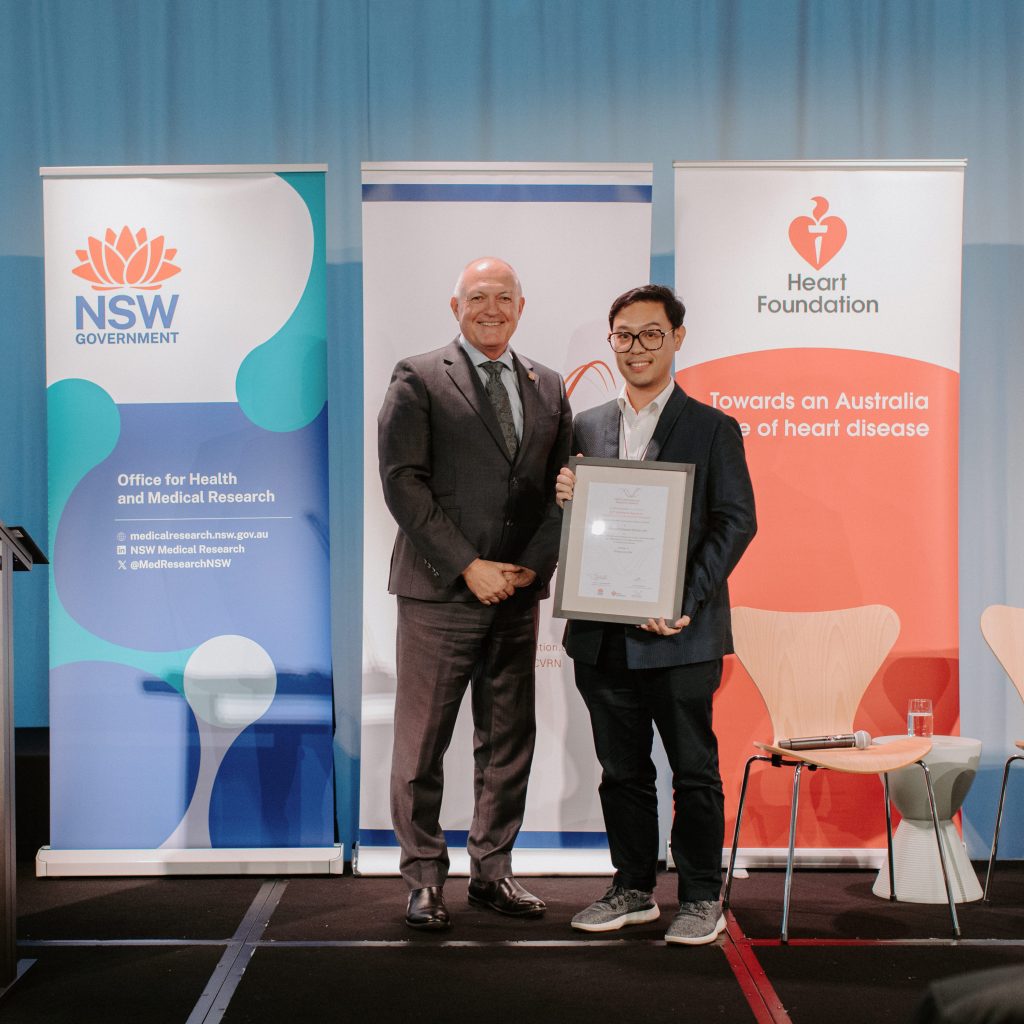
Associate Professor Khoon Lim: Ministerial Award for Rising Star in Cardiovascular Research
Lim is an Australian Research Council Future Fellow who has been named in the World Top 2% Scientist List by Stanford University for the last two years. He is a biomedical engineer conducting ground-breaking work focused around biomaterials and biofabrication. This means he is using biomaterials including living cells, to build artificial tissues, organs or parts of organs in the laboratory. His particular area of focus is a class of polymers known as hydrogels, which are materials with jelly-like features. His work utilises hydrogels that respond to light for 3D bioprinting of tissues and organs. “I am looking at how different biomaterials can drive cellular function, with a focus on improving vascular health,” Lim explains. “I am currently using biomaterials as tissue engineering matrices (forms of scaffolding) to explore how best to create functional blood vessels in the laboratory.”
Lim’s high-quality work has helped him receive 29 competitive grants totalling $7.8 million and he has contributed to 79 peer-reviewed journal articles. Recently, he received a CVD Elite postdoctoral grant from OHMR, providing him with research funding from 2023 to 2026. “I hope that one day we will be able to engineer functional blood vessels in the laboratory,” says Lim who is President of the Australasian Society for Biomaterials and Tissue Engineering. He is also a member of the World Health Organization’s 3D Bioprinting Futures Foresight Project, where he contributes to policymaking and governance in 3D bioprinting.
“The thought that my research and the technology it helps to create will be translated to the clinic as a therapy or treatment for cardiovascular disease is a key driver for my work,” says Lim. In the future he hopes his research may also be applied to areas such as cancer and musculoskeletal health. “This award is not just a recognition but also an endorsement that the research direction that I’ve taken is beneficial,” Lim says. “It provides me with more confidence and motivation to continue what I’m doing, and hopefully will also attract more people to reach-out and collaborate. I believe we can do so much more together and collectively, the impact will be greater. “
In addition to promoting inclusivity and diversity in science, Lim would also like to change the image of scientific research to help draw more bright young minds to the field. “There is this misconception that scientists are serious nerds, and science is hard, boring and filled with failure,” he says. “Action movies often feature a mad scientist holed up in the laboratory, who turns into a villain when some science experiments go horribly wrong – such as the green goblin and Dr octopus in Spider-Man. But I think being a scientist is incredibly fun and exciting as you get to make discoveries and you are constantly innovating and creating. It’s extremely rewarding to see the positive impact that this innovation is having in cardiovascular research.”
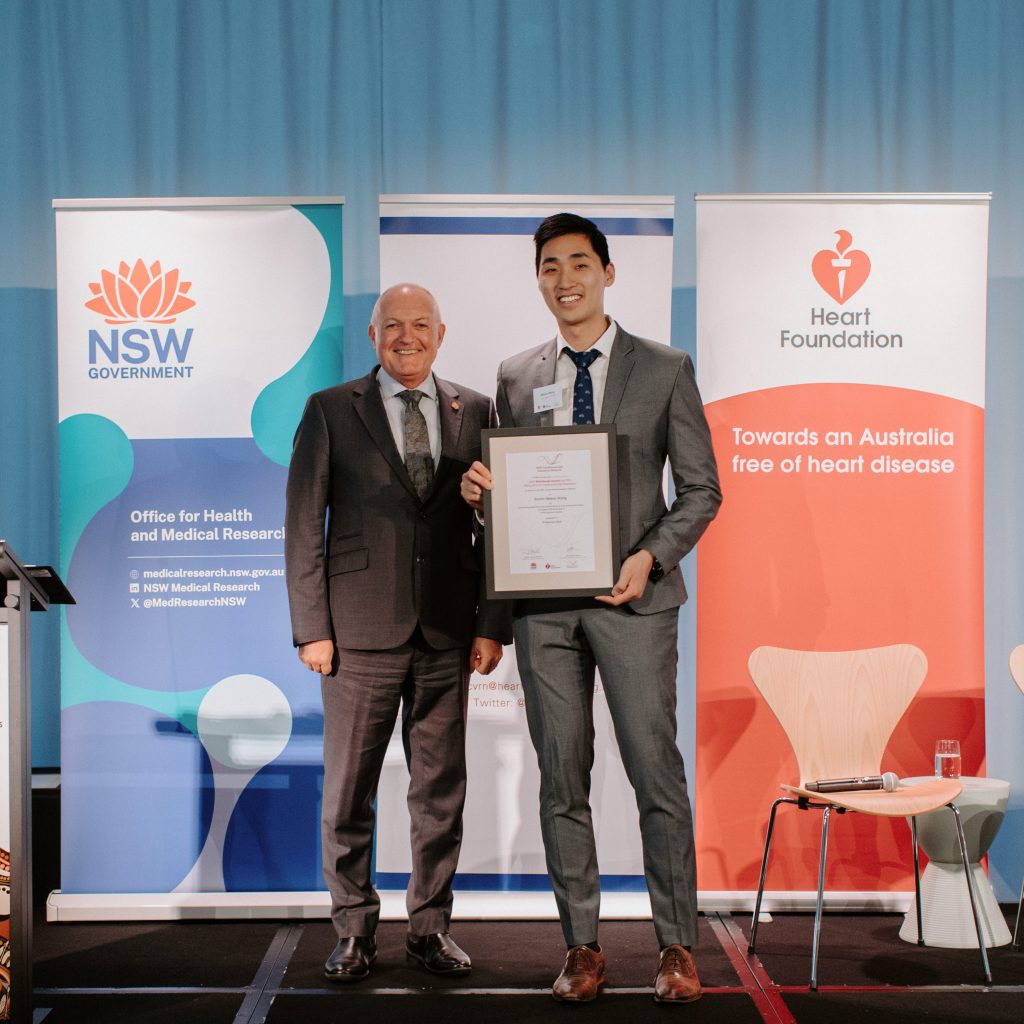
Dr Nelson Wang: Ministerial Award for PhD Rising Star in Cardiovascular Research
Wang is a Research Fellow at The George Institute for Global Health, a practicing doctor and a current cardiology fellow at Royal Prince Alfred Hospital in Sydney. His award recognises him as one of the most gifted NSW PhD graduates working in cardiovascular disease. Wang’s research has focused on blood pressure and cholesterol management to reduce CVD. “I chose this area because heart disease is the number one killer globally and I wanted to focus my work where it can have the biggest impact on society,” Wang explains. “I then concentrated on high blood pressure and cholesterol because they are the two major modifiable risk factors for heart disease. For my work I have applied the ‘cumulative risk factor hypothesis’, which is the idea that a person’s cardiovascular disease risk is not only related to how high their blood pressure and cholesterol are but is also linked to the duration of exposure to those risk factors.”
Wang’s research has been published in prestigious journals including The Lancet, Diabetes and Endocrinology, JAMA Cardiology and the Journal of American College of Cardiology. It has also opened the door to global collaborations, which have resulted in landmark contributions to the journal, Nature Medicine. His academic journey has included completion of numerous degrees at the University of Sydney including a Bachelor of Science, Doctor of Medicine and Masters of Philosophy as well as a Doctor of Philosophy at the University of New South Wales.
In the future, Wang hopes that his research is able to impact clinical practice by preventing cardiovascular disease through better blood pressure and cholesterol lowering strategies. These include the use of combination therapies, such as low dose triple combination antihypertensive medication, which has been proven to be more effective. His research also focuses on the importance of treating young patients who have uncontrolled risk factors. “I feel very honoured and grateful to have received this award which provides further inspiration to continue doing my work in cardiovascular research,” says Wang, who would like to still be a practicing researcher in CVD prevention in 10 years’ time. “I hope this award serves as a stepping stone for me to continue collaborating with researchers around NSW, with the common goals of reducing cardiovascular disease in Australia and globally. My long-term major goal is to become a practicing heart failure cardiologist.”
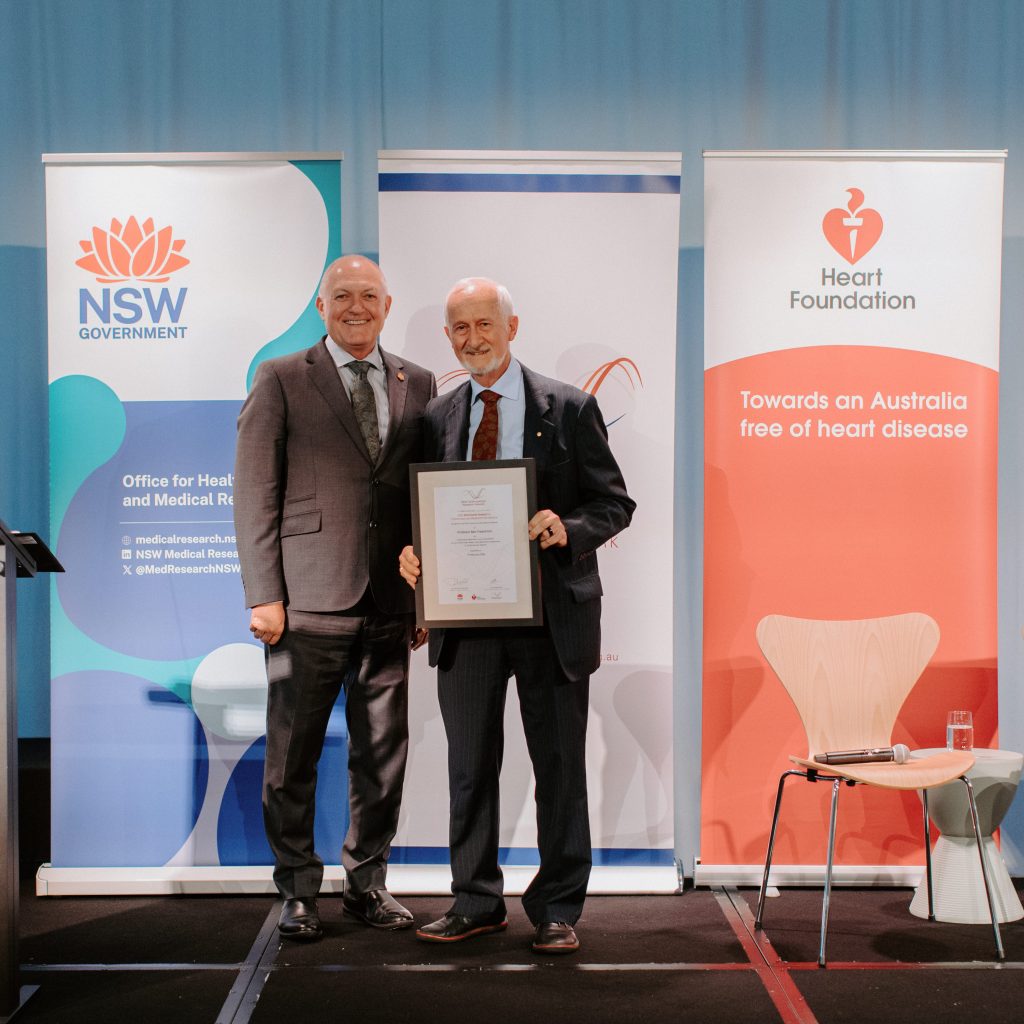
Professor Ben Freedman: Ministerial Award for Cardiovascular Research Excellence
Freedman is Group Leader of the Heart Rhythm and Stroke Group at the Heart Research Institute (HRI), where he is also Director of External Affairs. His career spans more than 40 years and 300 publications and his award recognised his outstanding dedication and achievements as one of the most gifted senior researchers in CVD in NSW. For his service to medicine as a clinician, educator and researcher, Freedman was awarded an Order of Australia Medal in 2011. Freedman’s research and practice have improved understanding and outcomes for cardiovascular disease in a range of areas. These include antianginal agents (new and old treatments for heart pain due to blocked arteries), unstable angina (chest pain) and heart attack. Another major career focus has been improving atrial fibrillation screening (AF). “Atrial fibrillation is the most common abnormal heart rhythm and once you reach the age of 40, you have a 1 in 3 lifetime change of developing it, yet many Australians don’t even know what it is,” Freedman explains. In the last 10 to 15 years, his research focused on portable devices to improve detection of AF. “We tested the first handheld ECG recorder device, called the Alivecor ECG recorder, which was attached to a smart phone,” Freedman points out. “This showed that it could be used to effectively screen for atrial fibrillation. We were the first in the world to do this. Now it is the most widely sold device for this purpose globally.”
For nine years, as the Deputy Dean of the Medical Faculty at the University of Sydney, Freedman played a vital role in shaping the education of medical practitioners in NSW. For this role he received the Faculty’s Inaugural Distinguished Service Award in 2012. Freedman is extremely passionate about mentoring the next generation of clinicians. This commitment has led him to supervise more than 40 PhD and Higher Degree Research students, and advanced trainees in Cardiology. Many of those that he took under his wing have followed in his footsteps to also become influential leaders and innovators in CVD health. “Cardiovascular disease is the leading cause of death and disability in Australia and my desire to reduce both impacts drove me to become a clinician and researcher in this area,” says Freedman, who is also Honorary Professor of Cardiology at the University of Sydney. “Six months ago, I myself unexpectedly had a stroke. I’m one of the lucky ones and I have had few ongoing health impacts. But when this happens to you, you gain new understanding of the condition through your lived experience and this informs and enhances your research.” Freedman’s stroke research has been supported by a 2022 NSW Health Cardiovascular Senior Researcher Grant (administered by the Office for Health and Medical Research) for work on Preventing Disabling Stroke from Unknown and Undertreated AF.
In his lengthy career, there have been many highlights. “Forming the AF Screen International Collaboration in 2015 is definitely one of them,” Freedman explains. “I did this with five other CVD clinicians and we now have well over 200 members including many leading names in Atrial Fibrillation research from 40 countries. This will be one of my legacies, but probably my biggest legacy is in the people who have trained with me. They are my greatest career achievement. Supporting young up and coming researchers and clinicians is central to the continuation of the cutting-edge work that NSW Health is doing in the area of CVD.”
Improving how we conduct research and tying this closely to implementation and clinical work are pivotal to innovation and best practice, Freedman believes. To that end he is currently engaged in working with leaders of the Djurali Centre for Aboriginal and Torres Strait Islander Health, Research and Education, who have now partnered with the Heart Research Institute at the University of Sydney. “They have taught me how to do research in First Nations people,” Freedman says. “The secret is called co-design. You ask the Aboriginal community and you ask the elders to be part of your research and to design the project with you. This approach is helping to ensure that the work we are doing around First Nations heart health is meaningful to these communities and will deliver something that is culturally appropriate and accessible that they will benefit from.”
Updated 1 year ago